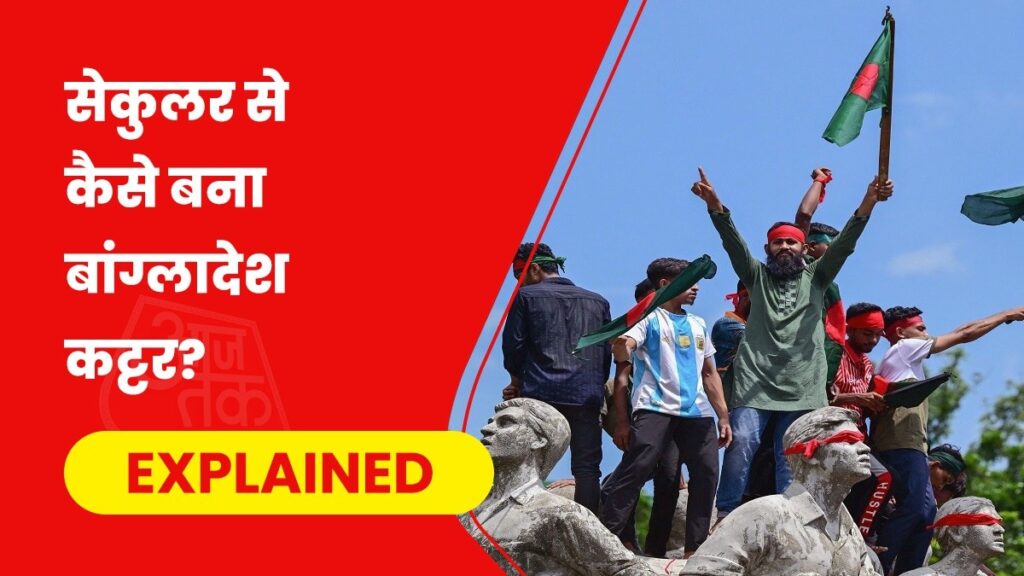There are reports of violence against Hindus from Bangladesh. The situation has worsened since Sheikh Hasina resigned and left the country. The Bangladesh Hindu Buddhist Christian Unity Council claimed that a large number of Hindu homes and businesses were destroyed between Monday and Tuesday. Immediately after independence, Bangladesh was a secular country, which was turned into a radical country by an army officer. After coming to power in 2011, Sheikh Hasina accepted secularism as a part of the constitution but also reiterated that Islam is the religion of the country.
Bangladesh, which separated from Pakistan in the name of language, had about 22 percent Hindus in the seventies, while the Buddhist and Christian communities were separate. But things changed as soon as it became an Islamic nation constitutionally. Currently, only about 8 percent Hindus are left here, and they too are facing violence and discrimination. Meanwhile, there is also mention of that military general who changed Bangladesh in this way.
General Hussain Mohammad Irshad was born in Cooch Behar, West Bengal. After independence and partition, his family moved to the eastern part of Pakistan, which is now Bangladesh. After graduating from the University of Dhaka, Irshad joined the East Bengal Regiment. He was then an officer in the army, but during the Bangladesh Liberation War, Irshad showed a different side of himself. He emerged as a fiery leader.

In 1975, the then Army Chief General Ziaur Rahman gave him a big position. Ershad was now recognised as a military-political force in the whole of Bangladesh. Even before the beginning of the eighties, the events started changing. Many big leaders were assassinated and in the meantime, Ershad himself came to the post of President by forcibly taking consent from the then President Abdus Sattar.
In 1986, he formed a political party named Jatiya Party and won the presidential election. The period after that is known as the period of military dictatorship. At the same time, Bangladesh, formed by Bengali-speaking people, shed its secular garb and became an Islamic country.
General Ershad pressured the parliament to make Islam the official religion. Earlier, during the time of liberation war leader Sheikh Mujiburahman, the country was considered completely secular. The new military president’s thinking soon gained popularity. He made the controversial fifth and eighth amendments to the constitution, which led the country towards fundamentalism.

First of all, the day of holiday was changed. The common weekly holiday of Sunday was changed to Friday. At the same time, Jamaat-e-Islami was revived. This was a fundamentalist Islamic organization, which had opposed the partition of East Pakistan in the freedom struggle. With the news of the formation of Bangladesh, the leaders of Jamaat had gone to Pakistan and were hiding there. Now they have started coming back to Bangladesh and spreading fundamentalism. Let us tell you that Jamaat-e-Islami is also believed to have a big hand in the recent coup.
During the time of Ershad, who was known as the most cruel dictator of Bangladesh, Bangladesh became a victim of corruption and poverty. This was the time for change. Awami League leader Sheikh Hasina and Bangladesh Nationalist Party leader Khaleda Zia united and started a campaign against Ershad. The public was with them in this. In the beginning of the nineties, Ershad not only had to leave the post, but he was also put in jail in the case of corruption.
Even while being in jail for almost a decade, he contested elections twice, won and became a kingmaker by supporting the Awami League. However, this general could not return to active politics again.
Power kept changing in Bangladesh, which was fed up with fanaticism, but it could not become a secular state.
Source (PTI) (NDTV) (HINDUSTANTIMES)
